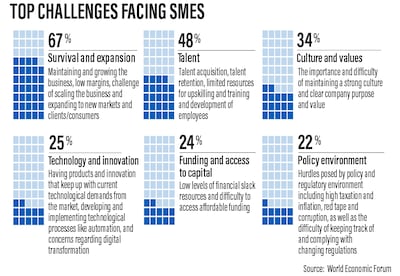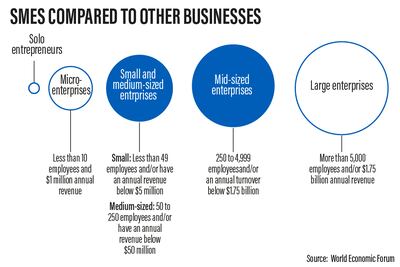About two thirds of the world's small and medium enterprises said fighting for survival was their biggest challenge this year, as they strive to maintain and grow their businesses amid low margins and expanding to new markets, a report from the World Economic Forum (WEF) showed.
Talent issues were the next biggest obstacle, with almost half of SMEs — which represent about 90 per cent of all companies globally — saying they are finding it difficult to acquire, retain and upskill their staff, the WEF said in the study in collaboration with the National University of Singapore.

More than a third of respondents said maintaining a strong culture and clear company purpose was a challenge, while a quarter cited keeping up with technological demand and access to funding as hindrances to their growth, it said.
On top of these, inflation, rising interest rates and the ripple effects from Russia's military offensive in Ukraine have added to the challenges, necessitating SMEs to make the right decisions in their strategies, said Rashimah Rajah, a professor at the NUS and co-lead author of the report.
“SMEs and mid-sized companies have unique strengths in their ability to pivot their business models to be more future-ready and, by hiring and developing the right talent, they can mobilise positive internal and external change faster than larger companies," she said.
"However, to fully realise their potential, they also need the support of policymakers in recognising their credentials as well as in rewarding sustainability initiatives.”
SMEs are considered the backbone of an economy and have played a critical role in the private sector, making up a significant portion of businesses. They are responsible for more than two thirds of employment and gross domestic product worldwide, according to WEF data.
Small businesses are generally defined as those with fewer than 49 employees and/or an annual revenue of up to $5 million, while medium ones have between 50 to 250 staff and/or annual revenue below $50 million.

In aggregate, they play a significant role in enabling and shaping growth, innovation and sustainability in economies of all levels.
Globally, the value of SMEs is expected to hit $55.6 trillion by 2027 at a compound annual growth rate of 27.4 per cent, from an estimated $13 trillion in 2021, data from US-based research firm Imarc Group indicated.
The challenges stated in the WEF report magnify the state of SMEs, which are more vulnerable to economic shocks than large corporates and well-funded, technology-focused start-ups.
Large corporates tend to be established, have numerous areas of operations and have more to fall back on, contributing to strong cash flows and enabling them to navigate through difficult situations with fewer challenges, the report said.
Start-ups, meanwhile, have been in favour with investors due to the innovations they bring to the market. Last year alone, global start-up funding soared to $621 billion, more than double 2020's $294 billion, CB Insights said.
SMEs tend to be more financially fragile, have smaller cash buffers and weaker supply chain capabilities, as well as a lower uptake of digital tools, the WEF said. Additionally, they also have limited access to finance, skilled labour and infrastructure to help them stay afloat during economic crises.
"It is therefore vital that SMEs and mid-sized companies 'build in' resilience and increase their chances of survival in the short term while building their ability to respond to future shocks and disruptions," the WEF said.
"With the lack of financial resources to offer competitive salaries and incentives, it is even more crucial for smaller businesses to hire and train the right people."
The Covid-19 pandemic also hit hard, with some estimating as much as a third of small companies closed, eventually resulting in permanent shutdown, the report said.
In terms of keeping up with digital transformation, the WEF argued that despite its "undisputed" importance, this was still largely neglected by SMEs and mid-sized companies.
Growing interest from these firms has focused mainly on applying digital technology to enhance products and services, but the application of digital tools to enhance production and service delivery is often overlooked.
"Management needs to first understand the framework for enacting digital transformation to analyse where they can make the most out of their currently available strengths and where they might need additional resources," it said.


